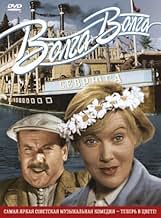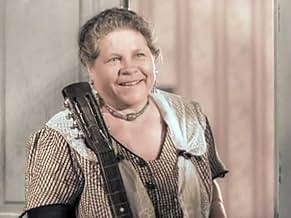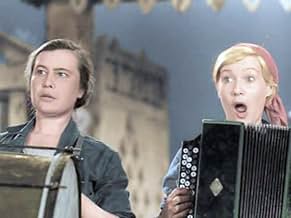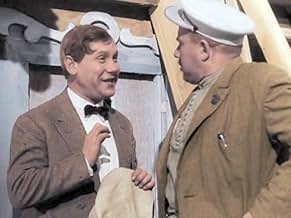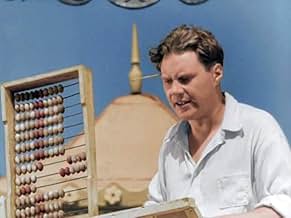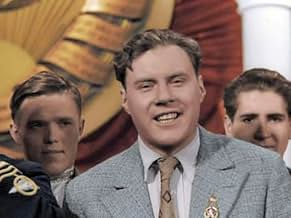VALUTAZIONE IMDb
6,6/10
832
LA TUA VALUTAZIONE
Aggiungi una trama nella tua linguaWidely claimed to be Joseph Stalin's favorite movie, this classic musical comedy is a must-see. The action takes place on a steamboat on the iconic Volga River, as two groups of performers t... Leggi tuttoWidely claimed to be Joseph Stalin's favorite movie, this classic musical comedy is a must-see. The action takes place on a steamboat on the iconic Volga River, as two groups of performers travel to Moscow to perform in the Moscow Musical Olympiad.Widely claimed to be Joseph Stalin's favorite movie, this classic musical comedy is a must-see. The action takes place on a steamboat on the iconic Volga River, as two groups of performers travel to Moscow to perform in the Moscow Musical Olympiad.
- Regia
- Sceneggiatura
- Star
- Premi
- 1 vittoria in totale
Anatoli Shalayev
- The Boy Musical Prodigy
- (as Tolya Shalayev)
Mariya Mironova
- The Secretary
- (as M. V. Mironova)
Nikita Kondratyev
- The Waiter
- (as N. S. Kondratyev)
Vsevolod Sanaev
- The Lumberjack
- (as V. V. Sanayev)
Alexei Dolinin
- The Militia Man
- (as A. G. Dolinin)
Ivan Chuvelyov
- The Olympiad Representative
- (as I. P. Chuvelyov)
Nikolai Khryashchikov
- Appearing
- (non citato nei titoli originali)
Yakov Rykov
- Tugboat captain
- (non citato nei titoli originali)
Lidiya Vinogradova
- Amateur Performer
- (non citato nei titoli originali)
Recensioni in evidenza
How often do film reviews of American and British films begin by mentioning such things as Winston Churchill being the 20th century's greatest mass murderer for having killing over 7 million Indians in the Indian Holocaust in Bengal; 1 million Kenyans during the Mau Mau Rebellion, and millions more in other holocausts? As to the US, it has killed more people since WW2 in wars for oil profits than the Nazis could ever have dreamed about in WW2. If you want to talk about torture (Guantanamo), gulags (prisons), and a police state where only the rich have freedom, because they can buy justice, the US should be number one on your list. Yet, while there is no mention of any of these atrocities when American and British films are reviewed. So why is it everyone has to suffer every time they read a review of a Soviet film; reciting ad nauseum supposed atrocities committed by the Soviet Union and Stalin by people who have never been there and have no idea what the reality maybe. Why can't a film review actual begin by criticizing the merits or lack of merits in a film instead?
Is Volga Volga, Soviet film propaganda? Of course, but so is all film. Films cost millions to produce. You need financing. You need distribution. For example, ever wonder why you don't see poverty in American films? Quite simple, American films are self-censored by the Bankers/Financiers. American films are created to be both escapist fantasies for those in this country and to propagate to people abroad: Look capitalism is great-everyone owns their own home, drives a brand new car, and barely works. The American film industry is so successful, I have to fight with people abroad that according to the US Census Bureau figures ½ the US population lives at or near the poverty level. Why am I bringing this up? Because it would be nice if for a change a review of a Soviet film was actually concerned with criticizing the merits of a film rather than spewing rabidly anti-communist just for the sake of it. I hope this will be my contribution to this film review.
Volga, Volga is an exciting Russian musical comedy in the vaudeville tradition of historical interest. Stalin had numerous private screenings at the Kremlin; often teasing Khrushchev of his likeness to Byvalov, the corrupt, boorish, village bureaucrat. He was so was so proud of this film, he presented it to Roosevelt as a gift. Some say it was his favorite film.
Not as well-directed as many US musicals of the time, the film is at times a bit laborious to watch, especially in the beginning; and if you're Russian you won't catch some of the humor. However, these faults are easily overcome by its sheer energy, wit, and enthusiasm.
The film is an escapist fantasy with a politically-charged message. Made at a time when Russia was becoming more urbanized and industrial, the film depicts the charms of rural life. The simple plot seems to revolve around an engaged young couple and a musical competition taking place in Moscow. They break up as each tries to compete for who gets to Moscow first to perform. There is singing, dancing, romance and of course a happy ending.
What makes Volga, Volga a propaganda film? Is the fact, the people are shown to take actions on their own accounts. The main plot, easy to miss, revolves really around Byvalov and the rural community he is supposed to serve. From the beginning, we see a corrupt, self-serving official who only cares about "moving up". Forced to ride on a slow horse, because he refused to invest in any modern vehicles, he also refuses to allow the villagers to participate in the contest, feeling they are too backwarded to be talented. This forces the villagers to take matters into their own hands. As the villagers state at the end of the film: "We are glad you laughed! Opportunists like Byvalov are petty in their thoughts and actions. They obstruct our work: We must clean all the garbage. Sweep it away."
Contrary to popular misconceptions in West, the facts are that Stalin was trying to institute elections after WW2. However, the Comitern (the Soviet parliament) refused to vote for such measures; members like Khrushchev, who by the way hated Stalin and is partially credited for the anti-Stalin lies told about him.
A musical comedy. The famous work of the famous director Grigory Alexandrov and the actress Lyubov Orlova, beloved by millions at that time, as well as Comrade Stalin's favorite film, which he often reviewed. And how could you pass by such a thing? So the author of this review could not do this, and looked at the picture with great pleasure. And the final result rather pleased him. And here is a brief opinion - A good Soviet musical comedy of the late thirties. There were almost only advantages in it (with the exception of editing, but the author of this review will tell you about this in a separate paragraph), but for now you should finish the introduction and move on to the interesting.
So, here are the pros: 1. The scenario - the picture tells the story of two amateur musical groups that go to Moscow to participate in the Olympics, and the leaders of these groups: Avdotya Petrova, nicknamed "Strelka" and Alexey Trubyshkin are lovers, which gives everything that is happening a whisper of piquancy. At the same time, the local bureaucrat Byvalov takes part in all this activity, who wants to "push himself" at the expense of talented people. The old pilot fits well into this company. There are many different situations waiting for them on the way, and in the final there will be a grand triumph. In addition, the creators even destroy the "fourth wall", which looks pretty good. In addition to the fact that the script here is easy, it also charges every viewer who looks at the picture with a great mood. It's worth a lot.
2. Humor - there are frankly funny moments, and a lot of funny situations, and outright antics of some actors (in most cases it works correctly). Of course, wild laughter is not worth hoping for, although there is one point that strongly leads to this. The humor here is more mundane, and that's what catches on.
3. Songs and music - this picture can now be called a musical with full rights, since they sing and dance quite often here - and it turned out just great. The precision of the movements, and this despite the fact that some of the artists were already far from young. And the songs are pleasing to the eye and ear. Although there is not a single one that sticks in the memory (except classical music, which everyone knows). Although their text was written by Vasily Lebedev-Kumach.
4. The life of the USSR in the thirties - we will be shown the Volga-Don Canal, which was one of the great buildings of communism, musical competitions, and not only. They will show us how life itself is changing, how the achievements of the Soviet government made the dreams of ordinary people a reality. And although the scenario line with Byvalov is reduced to humor, it reflects reality (which is still relevant).
Now it should be said about an important point that somewhat spoils the overall impression, namely the crooked installation, and the author of this review watched the color version of the painting, which was castrated in the fifties of the last century, and the original of 1938 has not been preserved (thank you tell the Cornhusker for this), so we cannot enjoy the original version. And it's lucky that they didn't paint the fully castrated version, because there is a black-and-white version from 1961, from where all mentions of Stalin, his images and busts were cut out. The installation was done very poorly and the glues are visible (this is written by a person who has been engaged in installation for a long time).
Separately, the author of this review wants to thank the artists Igor Ilyisky (bureaucrat Byvalov), Lyubov Orlova, Andrei Tutyshkin, Vladimir Volodin (old pilot), and all the others for the talented performance of their roles in this musical comedy. Now their acting will seem too "pompous" to many, but they tried anyway, and it's not for nothing that the picture has gained well-deserved popularity, and it's not for nothing that it has gained cult status in the country. You need to know the classics!
A score of 8 out of 10 and a recommendation to watch!
So, here are the pros: 1. The scenario - the picture tells the story of two amateur musical groups that go to Moscow to participate in the Olympics, and the leaders of these groups: Avdotya Petrova, nicknamed "Strelka" and Alexey Trubyshkin are lovers, which gives everything that is happening a whisper of piquancy. At the same time, the local bureaucrat Byvalov takes part in all this activity, who wants to "push himself" at the expense of talented people. The old pilot fits well into this company. There are many different situations waiting for them on the way, and in the final there will be a grand triumph. In addition, the creators even destroy the "fourth wall", which looks pretty good. In addition to the fact that the script here is easy, it also charges every viewer who looks at the picture with a great mood. It's worth a lot.
2. Humor - there are frankly funny moments, and a lot of funny situations, and outright antics of some actors (in most cases it works correctly). Of course, wild laughter is not worth hoping for, although there is one point that strongly leads to this. The humor here is more mundane, and that's what catches on.
3. Songs and music - this picture can now be called a musical with full rights, since they sing and dance quite often here - and it turned out just great. The precision of the movements, and this despite the fact that some of the artists were already far from young. And the songs are pleasing to the eye and ear. Although there is not a single one that sticks in the memory (except classical music, which everyone knows). Although their text was written by Vasily Lebedev-Kumach.
4. The life of the USSR in the thirties - we will be shown the Volga-Don Canal, which was one of the great buildings of communism, musical competitions, and not only. They will show us how life itself is changing, how the achievements of the Soviet government made the dreams of ordinary people a reality. And although the scenario line with Byvalov is reduced to humor, it reflects reality (which is still relevant).
Now it should be said about an important point that somewhat spoils the overall impression, namely the crooked installation, and the author of this review watched the color version of the painting, which was castrated in the fifties of the last century, and the original of 1938 has not been preserved (thank you tell the Cornhusker for this), so we cannot enjoy the original version. And it's lucky that they didn't paint the fully castrated version, because there is a black-and-white version from 1961, from where all mentions of Stalin, his images and busts were cut out. The installation was done very poorly and the glues are visible (this is written by a person who has been engaged in installation for a long time).
Separately, the author of this review wants to thank the artists Igor Ilyisky (bureaucrat Byvalov), Lyubov Orlova, Andrei Tutyshkin, Vladimir Volodin (old pilot), and all the others for the talented performance of their roles in this musical comedy. Now their acting will seem too "pompous" to many, but they tried anyway, and it's not for nothing that the picture has gained well-deserved popularity, and it's not for nothing that it has gained cult status in the country. You need to know the classics!
A score of 8 out of 10 and a recommendation to watch!
Even those of us with some sort of education in the field of cinema rarely get to see other Soviet films than those of Eisenstein, Tarkovskij and maybe Pudovkin. It´s easy for every western film fan to become as prejudiced as the bureaucrat Byvalov in Volga-Volga: "Talent? in this dump?" My point being, of course, that it would be unfair to world cinema as well as to oneself if one were to deny oneself the pleasures of at least once in a while seeing a Feuillade serial, a German mountain film or a Soviet musical. Volga-Volga is an excellent choice for the curious cinephile. As everyone points out, it has the distinction of reportedly being Stalin´s favourite film, it has stars in it is well as great music, I could go on and on. The main reason for seeing Volga-Volga is of course that it´s great fun. It had me in stitches more than once.
A comment on polart´s vhs edition of Volga-Volga: Granted, the subtitles are yellow and eminently readable, but they are also quite often badly timed and frequently seem insufficient. Also, the framing seems to be slightly off, something i´m hesitant in blaming comrades Alexandrov and Petrov for.
A comment on polart´s vhs edition of Volga-Volga: Granted, the subtitles are yellow and eminently readable, but they are also quite often badly timed and frequently seem insufficient. Also, the framing seems to be slightly off, something i´m hesitant in blaming comrades Alexandrov and Petrov for.
The insane tempo of the film made me think that I had been sitting at least 3 enjoyable hours before my TV. I use "enjoyable" in its direct sense. As a musical comedy the film is superb and can put to shame any today's production of "Stariye pesni o glavnom" calibre.
The ideology, though present, is not showing off. What the film is really showing off is talents. The talents come in battalions.
The famous chase scene, when all the dancing, playing, and singing villagers are after Byvalov, is unforgettable. I also enjoyed the race of the ships presented in a panorama view. The number of catchy phrases is also to be mentioned (we hear them now and then in our reality - this is where they come from): "Allio, garazh!", "Kantseliarskaya krysa!", "Bez vodi...", etc.
The wise use of music, the numerous gags and stunts, the powerful characters with great voice talents, etc. make this film a gem of our black-and-white era.
There is fire in their eyes and there is atomic energy in their moves while their voices are piercing quicksilver bolts.
Today to shoot such an energetic film is simply impossible. People are too lost, too sick, and too weak. Too bad the Soviet times were also out of joint. The latter adds some bitter taste to the production, which has all the rights to be called the best comedy/musical of all time.
If I am in mood for rich national energetic heavy-duty entertainment with an artistic touch, this is a perfect example to inject into my DVD player and load onto myself. The beginning and the ending of the movie are both unique (and no portrait of Stalin and demonstrations - thanks a lot!).
Mrs Lyubov Orlova is again different and again excellent.
All in all it is definitely 10 out of 10: it entertains and makes it in a most artistic and favourable way. Thank you for attention.
The ideology, though present, is not showing off. What the film is really showing off is talents. The talents come in battalions.
The famous chase scene, when all the dancing, playing, and singing villagers are after Byvalov, is unforgettable. I also enjoyed the race of the ships presented in a panorama view. The number of catchy phrases is also to be mentioned (we hear them now and then in our reality - this is where they come from): "Allio, garazh!", "Kantseliarskaya krysa!", "Bez vodi...", etc.
The wise use of music, the numerous gags and stunts, the powerful characters with great voice talents, etc. make this film a gem of our black-and-white era.
There is fire in their eyes and there is atomic energy in their moves while their voices are piercing quicksilver bolts.
Today to shoot such an energetic film is simply impossible. People are too lost, too sick, and too weak. Too bad the Soviet times were also out of joint. The latter adds some bitter taste to the production, which has all the rights to be called the best comedy/musical of all time.
If I am in mood for rich national energetic heavy-duty entertainment with an artistic touch, this is a perfect example to inject into my DVD player and load onto myself. The beginning and the ending of the movie are both unique (and no portrait of Stalin and demonstrations - thanks a lot!).
Mrs Lyubov Orlova is again different and again excellent.
All in all it is definitely 10 out of 10: it entertains and makes it in a most artistic and favourable way. Thank you for attention.
When Stalin ordered Alexandrov to make this movie, he said he only wanted to see the happy images of the simple rural people along the river Volga. One could say, Stalin wanted something that would prove to him his people are happy (even if he ordered others to lie to him to make the appearance of happiness). There's no real story or plot, there's just a number of folk dances and rituals thrown together in order to entertain. It's kitch that served only one purpose - to make a dictator happy. I wouldn't even classify this movie as a comedy, it's simply a musical, or better yet a recorded account of folk dancing and singing with some attempts to moderate the time in between the musical sequences. Thus you should not even look for the depth of the characters or the story. Were it made that way Alexandrov might have even been shot! This film could not afford to be critical. IT was made in an era of Soviet history when one could not express one's self as an artist, but had to do what the propaganda machine demanded of him.
Lo sapevi?
- QuizFamously, this was Joseph Stalin's favorite film and he would often show off how well he knew it by performing every part just before the actors on screen.
- ConnessioniFeatured in Komediya davno minuvshikh dney (1980)
I più visti
Accedi per valutare e creare un elenco di titoli salvati per ottenere consigli personalizzati
Dettagli
- Tempo di esecuzione
- 1h 44min(104 min)
- Colore
- Mix di suoni
- Proporzioni
- 1.37 : 1
Contribuisci a questa pagina
Suggerisci una modifica o aggiungi i contenuti mancanti

